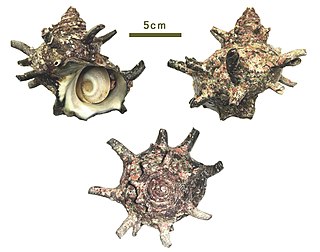
Turbinidae, the turban snails, are a family of small to large marine gastropod molluscs in the superfamily Trochoidea.

Calliostomatidae is a family of sea snails within the superfamily Trochoidea and the clade Vetigastropoda.

Stomatellinae is a subfamily of small sea snails with a brilliantly nacreous interior of the shell, marine gastropod mollusks in the family Trochidae, the top snails.
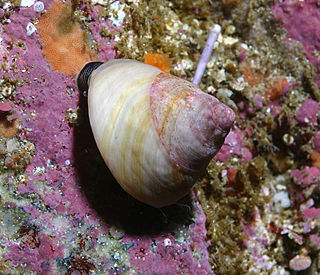
Trochoidea is a superfamily of small to very large vetigastropod sea snails with gills and an operculum. Species within this superfamily have nacre as the inner shell layer. The families within this superfamily include the Trochidae, the top snails. This superfamily is the largest vetigastropodan superfamily, containing more than 2,000 species.
The taxonomy of the Gastropoda as it was revised in 2005 by Philippe Bouchet and Jean-Pierre Rocroi is a system for the scientific classification of gastropod mollusks. The paper setting out this taxonomy was published in the journal Malacologia. The system encompasses both living and extinct groups, as well as some fossils whose classification as gastropods is uncertain.

Lepetellidae is a taxonomic family of small deepwater sea snails or limpets, marine gastropod molluscs in the superfamily Lepetelloidea in the clade Vetigastropoda. .
Trochaclididae, common name the false top snails, is a family of sea snails, marine gastropod mollusks in the clade Vetigastropoda.
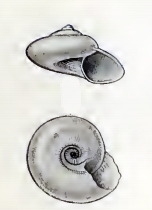
Solariellidae is a family of small sea snails, marine gastropod mollusks in the superfamily Trochoidea.

Liotiidae is a family of small sea snails, marine gastropod mollusks in the clade Vetigastropoda.

Vetigastropoda is a major taxonomic group of sea snails, marine gastropod mollusks that form a very ancient lineage. Taxonomically the Vetigastropoda are sometimes treated as an order, although they are treated as an unranked clade in Bouchet and Rocroi, 2005.
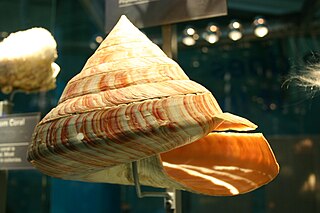
Pleurotomarioidea is a superfamily of small to large marine gastropods included in the order Pleurotomariida of the subclass Vetigastropoda.
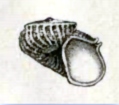
Scissurelloidea is a taxonomic superfamily of minute sea snails, marine gastropod mollusks or micromollusks in the subclass Vetigastropoda.
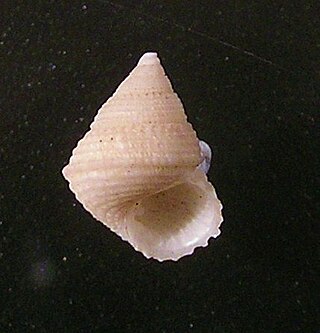
Seguenzioidea is a superfamily of minute to medium-sized sea snails, marine gastropod mollusks in the clade Vetigastropoda.

Angaria is a genus of sea snails, marine gastropod mollusks in the family Angariidae. Angaria is the only genus in the family Angariidae.

Colloniidae is a family of small sea snails with calcareous opercula, marine gastropod mollusks in the clade Vetigastropoda.

Angarioidea is a superfamily of small to medium sized sea snails, marine gastropod mollusks in the clade Vetigastropoda.

Areneidae is a family of sea snails, marine gastropod mollusks in the clade Vetigastropoda.
This overview lists proposed changes in the taxonomy of gastropods at the family level and above since 2005, when the taxonomy of the Gastropoda by Bouchet & Rocroi (2005) was published. In other words, these are recent updates in the way various groups of snails and slugs are classified.

Margaritidae is a family of small sea snails, marine gastropod mollusks in the superfamily Trochoidea.
Trochida is an order of small to very large vetigastropods. It includes recent and extinct sea snails with gills and an operculum.
















